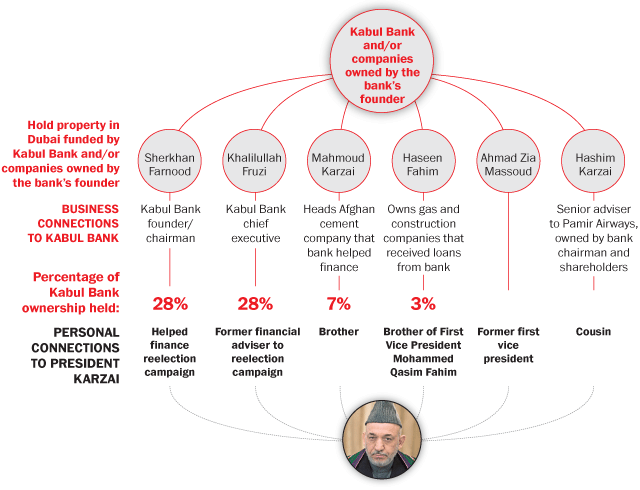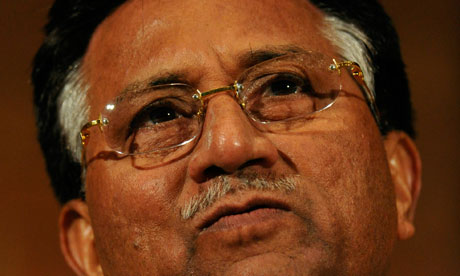By Andrew Higgins
Monday, February 22, 2010
www.washingtonpost.com
KABUL -- Afghanistan's biggest private bank -- founded by the Islamic nation's only world-class poker player -- celebrated its fifth year in business last summer with a lottery for depositors at Paris Palace, a Kabul wedding hall.
Prizes awarded by Kabul Bank included nine apartments in the Afghan capital and cash gifts totaling more than $1 million. The bank trumpeted the event as the biggest prize drawing of its kind in Central Asia.
Less publicly, Kabul Bank's boss has been handing out far bigger prizes to his country's U.S.-backed ruling elite: multimillion-dollar loans for the purchase of luxury villas in Dubai by members of President Hamid Karzai's family, his government and his supporters.
The close ties between Kabul Bank and Karzai's circle reflect a defining feature of the shaky post-Taliban order in which Washington has invested more than $40 billion and the lives of more than 900 U.S. service members: a crony capitalism that enriches politically connected insiders and dismays the Afghan populace.
"What I'm doing is not proper, not exactly what I should do. But this is Afghanistan," Kabul Bank's founder and chairman, Sherkhan Farnood, said in an interview when asked about the Dubai purchases and why, according to data from the Persian Gulf emirate's Land Department, many of the villas have been registered in his name. "These people don't want to reveal their names."

Afghan laws prohibit hidden overseas lending and require strict accounting of all transactions. But those involved in the Dubai loans, including Kabul Bank's owners, said the cozy flow of cash is not unusual or illegal in a deeply traditional system underpinned more by relationships than laws.
The curious role played by the bank and its unorthodox owners has not previously been reported and was documented by land registration data; public records; and interviews in Kabul, Dubai, Abu Dhabi and Moscow.
Many of those involved appear to have gone to considerable lengths to conceal the benefits they have received from Kabul Bank or its owners. Karzai's older brother and his former vice president, for example, both have Dubai villas registered under Farnood's name. Kabul Bank's executives said their books record no loans for these or other Dubai deals financed at least in part by Farnood, including home purchases by Karzai's cousin and the brother of Mohammed Qasim Fahim, his current first vice president and a much-feared warlord who worked closely with U.S. forces to topple the Taliban in 2001.
At a time when Washington is ramping up military pressure on the Taliban, the off-balance-sheet activities of Afghan bankers raise the risk of financial instability that could offset progress on the battlefield. Fewer than 5 percent of Afghans have bank accounts, but among those who do are many soldiers and policemen whose salaries are paid through Kabul Bank.
A U.S. official who monitors Afghan finances, who spoke on the condition of anonymity because he was not authorized to comment publicly, said banks appear to have plenty of money but noted that in a crisis, Afghan depositors "won't wait in line holding cups of latte" but would be "waving AK-47s."
Kabul Bank executives, in separate interviews, gave different accounts of what the bank is up to with Dubai home buyers. "They are borrowers. They have an account at Kabul Bank," said the bank's chairman, Farnood, a boisterous 46-year-old with a gift for math and money -- and the winner of $120,000 at the 2008 World Series of Poker Europe, held in a London casino.
The bank's chief audit officer, Raja Gopalakrishnan, however, insisted that the loan money didn't come directly from Kabul Bank. He said it was from affiliated but separate entities, notably a money-transfer agency called Shaheen Exchange, which is owned by Farnood, is run by one of Kabul Bank's 16 shareholders and operates in Kabul out of the bank's headquarters.
The audit officer said Farnood "thinks it is one big pot," but the entities are "legally definitely separate."
A new economy
In some ways, Kabul Bank is a symbol of how much has changed in Afghanistan since 2001, when the country had no private banks and no economy to speak of. Kabul Bank has opened more than 60 branches and recently announced that it will open 250 more, and it claims to have more than $1 billion in deposits from more than a million Afghan customers.
Many of those involved appear to have gone to considerable lengths to conceal the benefits they have received from Kabul Bank or its owners. Karzai's older brother and his former vice president, for example, both have Dubai villas registered under Farnood's name. Kabul Bank's executives said their books record no loans for these or other Dubai deals financed at least in part by Farnood, including home purchases by Karzai's cousin and the brother of Mohammed Qasim Fahim, his current first vice president...
The Washington Post, Feb.22, 2010Kabul Bank prospers because Afghanistan, though extremely poor, is in places awash with cash, a result of huge infusions of foreign aid, opium revenue and a legal economy that, against the odds, is growing at about 15 percent a year. The vast majority of this money flows into the hands of a tiny minority -- some of it through legitimate profits, some of it through kickbacks and insider deals that bind the country's political, security and business elites.
The result is that, while anchoring a free-market order as Washington had hoped, financial institutions here sometimes serve as piggy banks for their owners and their political friends. Kabul Bank, for example, helps bankroll a money-losing airline owned by Farnood and fellow bank shareholders that flies three times a day between Kabul and Dubai.
Kabul Bank's executives helped finance President Hamid Karzai's fraud-blighted reelection campaign last year, and the bank is partly owned by Mahmoud Karzai, the Afghan president's older brother, and by Haseen Fahim, the brother of Karzai's vice presidential running mate.
Farnood, who now spends most of his time in Dubai, said he wants to do business in a "normal way" and does not receive favors as a result of his official contacts. He said that putting properties in his name means his bank's money is safe despite a slump in the Dubai property market: He can easily repossess if borrowers run short on cash.
A review of Dubai property data and interviews with current and former executives of Kabul Bank indicate that Farnood and his bank partners have at least $150 million invested in Dubai real estate. Most of their property is on Palm Jumeirah, a man-made island in the shape of a palm tree where the cheapest house costs more than $2 million.
Mirwais Azizi, an estranged business associate of Farnood and the founder of the rival Azizi Bank in Kabul, has also poured money into Dubai real estate, with even more uncertain results. A Dubai company he heads, Azizi Investments, has invested heavily in plots of land on Palm Jebel Ali, a stalled property development. Azizi did not respond to interview requests. His son, Farhad, said Mirwais was busy.
Responsibility for bank supervision in Afghanistan lies with the Afghan central bank, whose duties include preventing foreign property speculation. The United States has spent millions of dollars trying to shore up the central bank. But Afghan and U.S. officials say the bank, though increasingly professional, lacks political clout.
The central bank's governor, Abdul Qadir Fitrat, said his staff had "vigorously investigated" what he called "rumors" of Dubai property deals, but "unfortunately, up until now they have not found anything." Fitrat, who used to live in Washington, last month sent a team of inspectors to Kabul Bank as part of a regular review of the bank's accounts. He acknowledged that Afghan loans are "very difficult to verify" because "we don't know who owns what."
Kabul Bank's dealings with Mahmoud Karzai, the president's brother, help explain why this is so. In interviews, Karzai, who has an Afghan restaurant in Baltimore, initially said he rented a $5.5 million Palm Jumeirah mansion, where he now lives with his family. But later he said he had an informal home-loan agreement with Kabul Bank and pays $7,000 a month in interest.
"It is a very peculiar situation. It is hard to comprehend because this is not the usual way of doing business," said Karzai, whose home is in Farnood's name.
Karzai also said he bought a 7.4 percent stake in the bank with $5 million he borrowed from the bank. But Gopalakrishnan, the chief audit officer, said Kabul Bank's books include no loans to the president's brother.
Also in a Palm Jumeirah villa registered in Farnood's name is the family of Ahmad Zia Massoud, Afghanistan's first vice president from 2004 until last November. The house, bought in December 2007 for $2.3 million, was first put in the name of Massoud's wife but was later re-registered to give Farnood formal ownership, property records indicate.
Massoud, brother of the legendary anti-Soviet guerrilla leader Ahmad Shah Massoud, said that Farnood had always been the owner but let his family use it rent-free for the past two years because he is "my close friend." Massoud added: "We have played football together. We have played chess together." Farnood, however, said that though the "villa is in my name," it belongs to Massoud "in reality."
Haseen Fahim, the brother of Afghanistan's current first vice president, has been another beneficiary of Kabul Bank's largesse. He got money from Farnood to help buy a $6 million villa in Dubai, which, unusually, is under his own name. He borrowed millions more from the bank, which he partly owns, to fund companies he owns in Afghanistan.
In an interview at Kabul Bank's headquarters, Khalilullah Fruzi, who as chief executive heads the bank's day-to-day operations, said he didn't know how much bank money has ended up in Dubai. If Karzai's relatives and others buy homes "in Dubai, or Germany or America . . . that is their own affair," Fruzi said, adding that the bank "doesn't give loans directly for Dubai."
Fruzi, a former gem trader, said Kabul Bank is in robust health, makes a profit and has about $400 million in liquid assets deposited with the Afghan central bank and other institutions. Kabul Bank is so flush, he added, that it is building a $30 million headquarters, a cluster of shimmering towers of bulletproof glass.
The bank is also spending millions to hire gunmen from a company called Khurasan Security Services, which, according to registration documents, used to be controlled by Fruzi and is now run by his brother.
The roots of Kabul Bank stretch back to the Soviet Union. Both Fruzi and Farnood got their education and their start in business there after Moscow invaded Afghanistan in 1979.
While in Moscow, Farnood set up a successful hawala money-transfer outfit to move funds between Russia and Kabul. Russian court documents show that 10 of Farnood's employees were arrested in 1998 and later convicted of illegal banking activity. Fearful of arrest in Russia and also in Taliban-ruled Afghanistan, Farnood shifted his focus to Dubai.
In 2004, three years after the fall of the Taliban regime, he got a license to open Kabul Bank. His Dubai-registered hawala, Shaheen Exchange, moved in upstairs and started moving cash for bank clients. It last year shifted $250 million to $300 million to Dubai, said the chief audit officer.
The bank began to take in new, politically connected shareholders, among them the president's brother, Mahmoud, and Fahim, brother of the vice president, who registered his stake in the name of his teenage son.
Fahim said two of his companies have borrowed $70 million from Kabul Bank. Insider borrowing, he said, is unavoidable and even desirable in Afghanistan because, in the absence of a solid legal system, business revolves around trust, not formal contracts. "Afghanistan is not America or Europe. Afghanistan is starting from zero," he said.
Also in London for the conference were Farnood, who now has an Afghan diplomatic passport, and Fruzi, who served as a financial adviser to Karzai's reelection campaign and also owns a house in Dubai. "If there is no Kabul Bank, there will be no Karzai, no government," Fruzi said.
The Washington Post, Feb.22, 2010Fahim's business has boomed, thanks largely to subcontracting work on foreign-funded projects, including a new U.S. Embassy annex and various buildings at CIA sites across the country, among them a remote base in Khost where seven Americans were killed in a December suicide attack by a Jordanian jihadiist. "I have good opportunities to get profit," Fahim said.
'Like wild horses'
Kabul Bank also plunged into the airline business, providing loans to Pamir Airways, an Afghan carrier now owned by Farnood, Fruzi and Fahim. Pamir spent $46 million on four used Boeing 737-400s and hired Hashim Karzai, the president's cousin, formerly of Silver Spring, as a "senior adviser."
Farnood said he also provided a "little bit" of money to help Hashim Karzai buy a house on Palm Jumeirah in Dubai. Karzai, in brief telephone interviews, said that the property was an investment and that he had borrowed some money from Farnood. He said he couldn't recall details and would "have to check with my accountant."
Noor Delawari, governor of the central bank during Kabul Bank's rise, said Farnood and his lieutenants "were like wild horses" and "never paid attention to the rules and regulations." Delawari said he didn't know about any property deals by Kabul Bank in Dubai. He said that he, too, bought a home in the emirate, for about $200,000.
Fitrat, the current central bank governor, has tried to take a tougher line against Kabul Bank and its rivals, with little luck. Before last year's presidential election, the central bank sent a stern letter to bankers, complaining that they squander too much money on "security guards and bulletproof vehicles" and "expend large-scale monetary assistance to politicians." The letter ordered them to remain "politically neutral."
Kabul Bank did the opposite: Fruzi, its chief executive, joined Karzai's campaign in Kabul while Farnood, its poker-playing chairman, organized fundraising events for Karzai in Dubai. One of these was held at the Palm Jumeirah house of Karzai's brother.
The government has returned the favor. The ministries of defense, interior and education now pay many soldiers, police and teachers through Kabul Bank. This means that tens of millions of dollars' worth of public money sloshes through the bank, an unusual arrangement, as governments generally don't pump so much through a single private bank.
Soon after his November inauguration for a second term, President Karzai spoke at an anti-corruption conference in Kabul, criticizing officials who "after one or two years work for the government get rich and buy houses in Dubai." Last month, he flew to London for a conference on Afghanistan, attended by Secretary of State Hillary Rodham Clinton and other leaders, and again promised an end to the murky deals that have so tarnished his rule.
Also in London for the conference were Farnood, who now has an Afghan diplomatic passport, and Fruzi, who served as a financial adviser to Karzai's reelection campaign and also owns a house in Dubai. "If there is no Kabul Bank, there will be no Karzai, no government," Fruzi said.
Correspondent Joshua Partlow in Kabul and special correspondent Anna Masterova in Moscow contributed to this report.
Dubai real estate deals for Afghans connected to Karzai
Companies owned by the founder of Kabul Bank, Afghanistan's largest private bank and employer, have financed several properties in Dubai for people connected to Afghan President Hamid Karzai.





